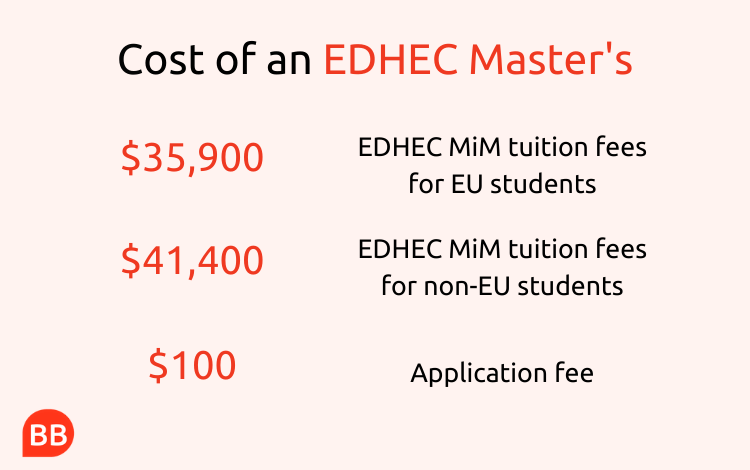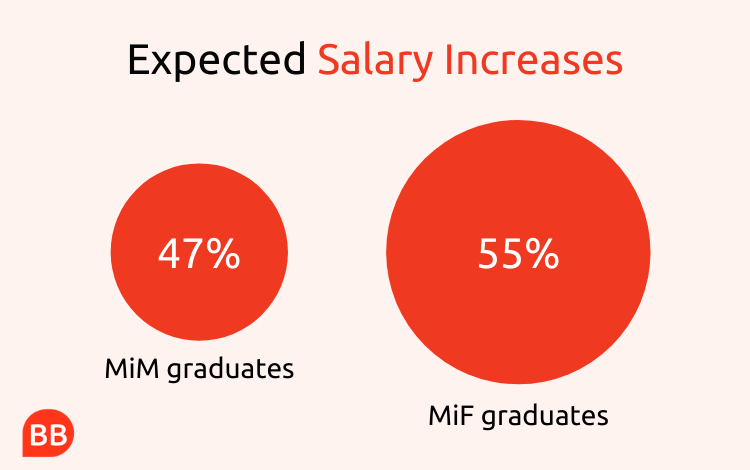Cost is the biggest source of reluctance among candidates pursuing a graduate business degree, according to a survey from the Graduate Management Admission Council (GMAC). Only 17% of candidates said cost had no impact on their decision.
But, for many candidates, the benefits—the career progression, network, and knowledge you'll gain—make the investment more than worth it.
When you’re evaluating how much you should spend on a business master's, you should look at the benefits of the degree compared with the cost, including what scholarships options may be available.
Cost of a Master’s Degree
When you’ve chosen to pursue a master’s degree, the next big decision will be where to study. Tuition fees vary greatly in different countries, despite most degrees being one year long and covering the same curriculum.
In the UK, a business master’s can reach up to $43,000 per year for international students, while in Europe the top programs can cost up to $60,000.

At EDHEC Business School in France, their flagship Master in Management (MiM) program costs $35,900 for EU students and $41,400 for non-EU students, plus an application fee of $120. EDHEC’s MSc courses, in comparison, carry tuition fees of $31,100, and are just one year long.
Tuition isn’t the only thing you’ll be spending money on as a master’s student. It’s important to include the cost of living, study books and equipment, and possible visa or healthcare expenses.
Living expenses will vary greatly depending on where your program is located, and whether your program is a one-year or two-year master’s course. Naturally, living in a capital city is going to be more expensive, while schools located in smaller cities may offer a cheaper cost of living.
EDHEC Business School has two campuses in France, located in Lille and Nice, both cities that are considerably cheaper than Paris. Rent in Nice is, on average, 28% lower than in the capital, while in Lille it is 44% lower.
Master's degree scholarships
If you’re worried about the cost of a master’s program, it can be helpful to know what kinds of scholarships are out there to help finance your program.
Most business schools will offer at least a couple of scholarships to students, usually covering all of part of the tuition fees for business programs and based on academic or professional achievement.
At EDHEC, there are a number of specialist scholarships—for example, the Eiffel Scholarship goes to high-achieving international candidates, while there are a number of partial merit scholarships offering a tuition fee reduction of up to 30%.
The school also offers two specific scholarships worth 50% of tuition fees for their Masters in Management program for Indian students, and a scholarship worth 100% of tuition fees for MSc programs for Russian students.
Aside from scholarships, there are other ways to finance your studies. Prodigy Finance offer postgraduate loans to international students attending certain EDHEC programs (excluding the GETT program) and other top business schools around the world, with no guarantor or co-signer necessary.
Make sure to take the time to seek out scholarships on school websites—there are usually more on offer than you’d imagine.
Return on investment of a master's degree
It might be difficult to see how you’ll pay back the cost of your master’s program. But master’s degree graduates often see quick returns on their investment, given enhanced job opportunities after they graduate.
EDHEC creates early relationships between masters students and companies on their masters programs—Jerome Troiano, director of the master’s career centre at EDHEC, says that students are given “invaluable access to companies.”
“We bring companies on campus, foster interactions between students and alumni, have career fairs and webinars,” Jerome adds. “We ensure students engage in fruitful relationships with companies.”

All of this leads to impressive returns—EDHEC Master’s in Management students achieve an average 48% salary increase after their studies, earning $78,607 three years after graduating. For Master of Finance students, the average salary Is $97,331, an increase of 55%.
On these salaries, students can expect to earn back the cost of their tuition fees in less than a year, which means you won’t be carrying around the cost of your program for long.
Aside from financial ROI, it’s also important to consider the relative cost of the skills you’ll be gaining on your Master’s program—especially on a practical course like a Master in Finance.
The Finance Master’s program at EDHEC is taught is collaboration with the CFA Institute, meaning at the end of their one-year program they will have all the skills necessary to sit the CFA Level 1 exam—an achievement that looks great on a resume and gives you the chance to access jobs at a higher level.
Aside from this, soft skills that are tested on all of EDHEC’s Master’s programs ensure that students are ready to work in any industry after graduating. Jerome categorises these skills as co-creation, global awareness, agility, and genuineness.
“Typically, students can access a very broad range of careers and industries,” Jerome says. “You can find EDHEC students and graduates across all industries.”
With all this taken into account, it’s clear that for students who are looking for an intensive foundation in business skills, a master’s degree is a great choice, in spite of the cost. Whether you’re looking for a longer, more intensive Master’s in Management program or a shorter MSc, there are impressive returns on investment to be had—both in terms of skills and salary.


